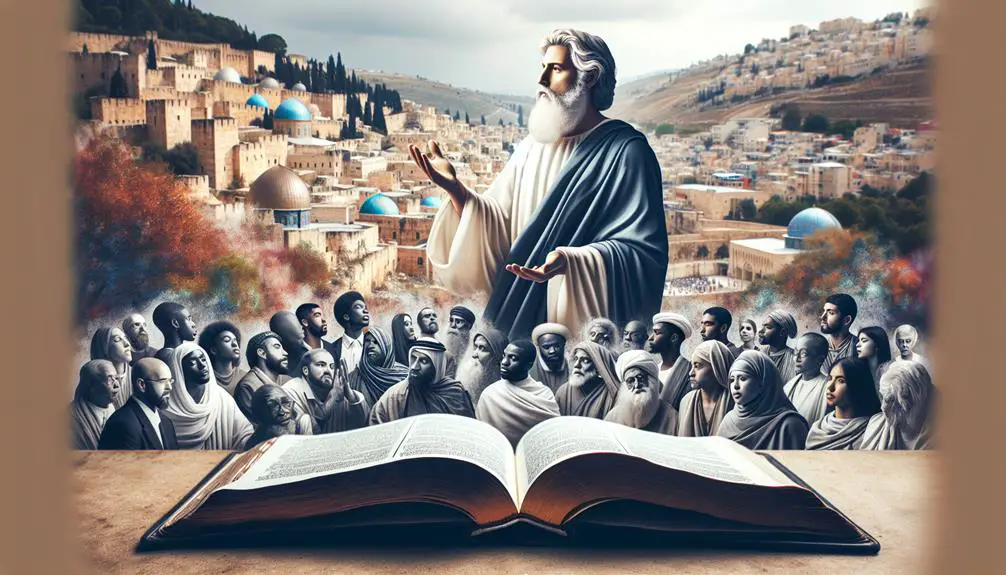Navigate the profound call to pray for Israel in the Bible, exploring its timeless significance and impact on faith and global relations.

Pray for Israel in the Bible
The invocation to pray for Israel permeates the biblical narrative, serving not only as a spiritual mandate but also as a reflection of the complex relationship between the divine and His chosen people.
From the fervent intercessions of the prophets to the poignant supplications encapsulated within the Psalms, the call to pray for Zion's peace and prosperity underscores a profound theological and communal ethos.
Yet, as we examine the teachings of Jesus on prayer, alongside the historical and modern implications of these scriptural admonitions, one is compelled to ponder the enduring significance of such prayers in contemporary religious practice and geopolitical discourse.
What deeper insights might we uncover about faith, identity, and our responsibilities towards one another in this ancient yet ever-relevant command?
Key Takeaways
- The Bible mandates prayer for Israel as an essential act of faith and reliance on God.
- Prophets like Moses and Elijah played crucial roles as intercessors, influencing divine favor through prayer.
- Psalms reflect a deep spiritual connection to Zion, highlighting its importance in prayerful supplication and hope.
- Jesus' teachings encourage sincere and humble prayers, redefining divine communication for believers.
Biblical Commands to Pray

The injunction to engage in prayer, particularly for the nation of Israel, is deeply embedded within the fabric of biblical literature, commanding the faithful to intercede on behalf of God's chosen people through a variety of explicit directives and implicit encouragements. This mandate underscores the prayer importance as a foundational act of faith and solidarity within the scriptural tradition. An analytical and exegetical examination of biblical texts reveals a multifaceted portrayal of prayer, not merely as a ritual obligation but as a profound expression of communal and individual devotion to God's purposes for Israel.
Prayer examples abound in the Hebrew Bible, where prayers for guidance, protection, and blessing upon Israel are recurrent themes. For instance, the Psalms frequently articulate a deep yearning for God's favor and sustenance towards the nation. These poetic prayers encapsulate the communal hopes, fears, and faith of the Israelites, serving as a timeless template for intercessory prayer. Similarly, narratives of figures like Moses and Daniel include fervent prayers for Israel's welfare, highlighting the integral role of prayer in sustaining and guiding the nation through periods of trial and transition.
The emphasis on prayer within the biblical corpus is not merely prescriptive but elucidates the intertwined relationship between divine providence and human agency. Through prayer, individuals and communities affirm their reliance on God while actively participating in the unfolding of His will for Israel. Thus, the biblical commands to pray for Israel not only reinforce the centrality of prayer in religious life but also affirm the collective responsibility of the faithful to seek divine intervention and blessing for God's people.
Prophets' Intercessory Prayers

Within the rich tapestry of biblical narratives, numerous prophets stand out for their roles as intercessors, engaging in fervent prayers on behalf of Israel, often during moments of critical national crisis or moral decay. These instances of prophetic intercession are not mere pleas for divine mercy; they represent profound engagements with the divine will, showcasing a deep commitment to the well-being of the nation and the fulfillment of God's promises.
Moses' advocacy is emblematic of this intercessory role. His interventions with God, especially after the incident of the Golden Calf, highlight a pivotal moment of intercession. Moses confronts God's wrath, invoking God's promises to Abraham, Isaac, and Jacob as a basis for sparing Israel. This episode not only underscores Moses' role as a mediator between God and Israel but also illustrates the power of intercessory prayer to alter divine judgment, thereby preserving the covenant relationship.
Elijah's challenge on Mount Carmel serves as another quintessential example of prophetic intercession. His prayer is not simply a call for divine vindication in the face of Baal worship but an appeal for Israel's heart to turn back to God. Elijah's confrontation with the prophets of Baal culminates in a dramatic demonstration of Yahweh's supremacy, yet at its core, it is a fervent plea for the restoration of Israel's covenant fidelity.
These narratives of Moses' advocacy and Elijah's challenge reveal the complexity of the prophetic role as intercessor. The prophets stand in the gap, not just to avert disaster, but to realign the heart of the nation with the purposes of God, demonstrating the profound impact of intercessory prayer in the biblical tradition.
Psalms: Prayers for Zion

Psalms, a profound collection of prayers, songs, and poems, serves as a crucial textual repository for the expressions of hope, lament, and divine supplication on behalf of Zion. Within this rich tapestry of lyrical theology, the Psalms articulate a deep-seated veneration for Zion, not merely as a geographical locus but as a symbolic manifestation of divine promise and presence. The recurring theme of Zion's beauty, both in its physical and spiritual dimensions, underscores the Psalms as a medium through which the faithful communicate their yearning for God's continued favor and protection over this sacred space.
Analyzing the Psalms, one notes that these musical prayers are not monolithic in their approach to Zion. Instead, they offer a multifaceted portrayal that interweaves despair with hope, and mourning with joy, reflecting the complex relationship between the divine and the chosen people. For instance, Psalm 137 poignantly captures the sorrow of exile with its lament for lost Zion, while Psalm 122 is an exuberant celebration of Jerusalem, urging peace and prosperity within its walls. This duality exemplifies the Psalms' role in fostering a communal identity centered around the memory and anticipation of Zion's glory.
Moreover, the exegetical exploration of these texts reveals an enduring belief in Zion as the epicenter of God's salvific plan, a place where heaven and earth intersect. Through their evocative imagery and fervent pleas, the Psalms encapsulate the essence of spiritual longing and divine covenant, making them a vital component of the biblical tradition of praying for Zion.
Jesus' Teachings on Prayer

Moving from the communal and poetic expressions of hope and divine supplication found in the Psalms, attention now shifts to an analysis of Jesus' teachings on prayer, which provide a distinct and transformative perspective on communication with the divine. Central to Jesus' instruction is the concept of prayer humility, an ethos that permeates his guidance to followers. This humility is not merely an attitude but a foundational approach to divine communication, emphasizing a relationship built on trust, reverence, and the acknowledgment of God's omnipotence.
Jesus' dialogues and parables consistently illuminate the essence of prayer humility. For example, in the Sermon on the Mount, he advises against ostentatious prayers designed for human admiration, advocating instead for a private, sincere communion with God. This directive underscores the intimate nature of divine communication, positioning it as a personal conduit for expressing one's deepest hopes, confessions, and gratitude, away from the public eye.
Moreover, Jesus introduces the Lord's Prayer as a model of divine communication, encapsulating the essence of prayer humility. This prayer exemplifies a balanced expression of reverence ('hallowed be thy name'), submission ('thy will be done'), and supplication ('give us this day our daily bread'). It signifies a relinquishing of ego, inviting God's guidance and provision, thus fostering a deeper, more authentic connection with the divine.
In essence, Jesus' teachings on prayer radically redefine the dynamics of divine communication. By emphasizing humility and sincerity, he invites believers to engage in a more profound, personal dialogue with God, one that transcends mere ritual and encompasses the totality of the human experience.
Modern Implications and Responses

In the contemporary era, Jesus' teachings on prayer continue to resonate, prompting diverse interpretations and applications within various Christian communities. These reflections are deeply influenced by prevailing political dynamics and cultural interpretations, which shape the way believers and theologians understand and engage with the biblical mandate to pray for Israel.
The modern discourse surrounding the prayer for Israel is characterized by:
- An increased politicization of religious beliefs: The complex political landscape of the Middle East, especially the Israeli-Palestinian conflict, has led to divergent views within Christian communities. Some interpret the biblical call to pray for Israel as an endorsement of the modern state of Israel and its policies, while others advocate for a more nuanced approach that includes prayers for peace and justice for all people in the region.
- Cultural interpretations influencing theological perspectives: Cultural backgrounds and national identities play significant roles in shaping how individuals and communities interpret the Bible's teachings on prayer for Israel. This has resulted in a wide spectrum of theological positions, from literal interpretations of biblical prophecy to allegorical readings that emphasize spiritual Israel.
- The role of ecclesiastical authority in guiding prayer practices: Different Christian denominations have offered varied guidance on how to pray for Israel, reflecting broader theological and doctrinal differences. Some leaders emphasize the importance of praying for the peace of Jerusalem, as mentioned in Psalm 122:6, while others focus on praying for reconciliation and the well-being of all inhabitants of the region.
These elements underscore the complex interplay between faith, politics, and culture in shaping contemporary Christian responses to the biblical call to pray for Israel.
Frequently Asked Questions
How Do Specific Archaeological Findings Support the Historical Context of Prayers for Israel in the Bible?
Archaeological findings play a pivotal role in corroborating the historical context of biblical narratives. Through meticulous artifact authenticity and precise dating methodology, scholars have unearthed items that align with scriptural accounts, thus providing tangible evidence of the practices and events described.
These discoveries not only validate historical claims but also offer a deeper understanding of the cultural and religious milieu, enriching our comprehension of ancient traditions and beliefs.
Are There Parallels in Other Ancient Texts Outside the Bible That Echo the Sentiment of Praying for Israel?
Exploring ancient texts reveals intriguing parallels and textual echoes to the sentiment of praying for a nation, akin to those found in the Biblical context for Israel.
Comparative analysis of these documents uncovers a shared cultural and religious practice among ancient civilizations, highlighting the universality of intercessory prayers.
Such findings not only enrich our understanding of historical religious dynamics but also underscore the commonality of seeking divine favor and protection across diverse ancient societies.
How Have the Translations of Prayers for Israel Varied Across Different Bible Versions, and What Impact Might These Variations Have on the Interpretation?
Translations of prayers for Israel exhibit notable variations across different Bible versions. These variations reflect diverse translation methodologies and the linguistic evolution of source texts. These discrepancies can significantly influence interpretational outcomes, leading to divergent theological and exegetical conclusions.
An analytical examination reveals that such variations not only mirror the historical and cultural context of translation efforts but also underscore the complexities inherent in rendering ancient texts into contemporary languages.
In What Ways Have Non-Abrahamic Religions or Belief Systems Recognized or Adapted the Concept of Praying for Israel?
Exploring the concept of praying for Israel outside Abrahamic faiths reveals a rich landscape of interfaith dialogues and instances of cultural appropriations. Various non-Abrahamic religions and belief systems have recognized or adapted this concept, albeit in diverse manners.
Such adaptations often stem from an analytical and scholarly engagement with the practice, leading to unique interpretations that sometimes blur the lines between religious observance and cultural exchange. These interactions provide valuable insights into exegetical understandings across different traditions.
How Do Contemporary Political Situations Influence the Way People Interpret and Engage With Biblical Commands to Pray for Israel Today?
Contemporary political situations significantly affect interpretations and engagements with biblical directives, including the command to pray for Israel. Political polarization and social media influence have exacerbated these impacts, leading to diverse and sometimes divisive understandings among communities.
Analytical examination reveals that these factors not only shape personal beliefs but also influence communal practices. The exegetical approach to this issue highlights the complex interplay between historical texts and modern political and social contexts.
Conclusion
In conclusion, the biblical injunctions to pray for Israel, the intercessory prayers of the prophets, the Psalms' emphasis on prayers for Zion, and Jesus' teachings on prayer collectively underscore the profound theological and spiritual significance of intercessory prayer within the Judeo-Christian tradition.
These texts not only advocate for a spiritual solidarity with Israel but also illuminate the broader principle of intercession as a crucial aspect of faith practice.
Their enduring relevance suggests a timeless call to engage in prayerful intercession for communities and nations, reflecting a deeply rooted biblical ethos.



Sign up